 W
WJakob Georg Christian Adler was a German Generalsuperintendent for Holstein and Schleswig, Orientalist, Syriac language professor at the University of Copenhagen, Lutheran theologian, Oberkonsistorialrat, book writer, religious educator, coin collector and head of the Schleswig-Holsteinische Bibelgesellschaft.
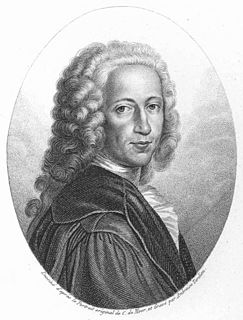 W
WBernhard Siegfried Albinus was a German-born Dutch anatomist.
 W
WDaniel Bernoulli FRS was a Swiss mathematician and physicist and was one of the many prominent mathematicians in the Bernoulli family from Basel. He is particularly remembered for his applications of mathematics to mechanics, especially fluid mechanics, and for his pioneering work in probability and statistics. His name is commemorated in the Bernoulli's principle, a particular example of the conservation of energy, which describes the mathematics of the mechanism underlying the operation of two important technologies of the 20th century: the carburetor and the airplane wing.
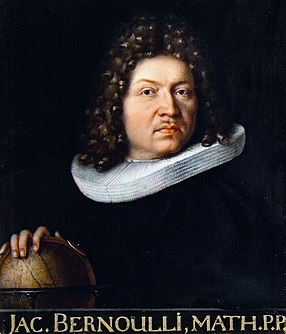 W
WJacob Bernoulli was one of the many prominent mathematicians in the Bernoulli family. He was an early proponent of Leibnizian calculus and sided with Gottfried Wilhelm Leibniz during the Leibniz–Newton calculus controversy. He is known for his numerous contributions to calculus, and along with his brother Johann, was one of the founders of the calculus of variations. He also discovered the fundamental mathematical constant e. However, his most important contribution was in the field of probability, where he derived the first version of the law of large numbers in his work Ars Conjectandi.
 W
WLeopold Gottlieb Biwald was a professor at the University of Graz.
 W
WJohannes Browallius, also called John Browall, was a Finnish and Swedish Lutheran theologian, physicist, botanist and at one time friend of Swedish taxonomist Carl Linnaeus.
 W
WJohann Franz Buddeus or Budde was a German Lutheran theologian and philosopher.
 W
WPieter Burman, also known as Peter or Pieter Burmann and distinguished from his uncle as "the Younger", was a Dutch philologist.
 W
WPieter Burman, also known as Peter or Pieter Burmann and posthumously distinguished from his nephew as "the Elder", was a Dutch classical scholar.
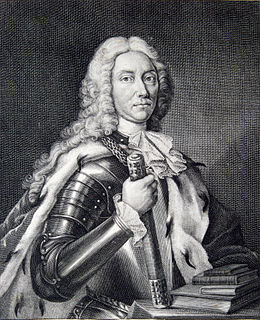 W
WDimitrie or Demetrius Cantemir, also known by other spellings, was a Moldavian soldier, statesman, and man of letters. He was twice voivode of Moldavia. During his second term, he allied his state with Russia in their war against Moldavia's Ottoman overlords; Russia's defeat forced Cantemir's family into exile and the replacement of the native voivodes by the Greek phanariots. Cantemir was also a prolific writer, variously a philosopher, historian, composer, musicologist, linguist, ethnographer, and geographer. His son Antioch, Russia's ambassador to Great Britain and France and a friend of Montesquieu and Voltaire, would go on to be known as "the father of Russian poetry".
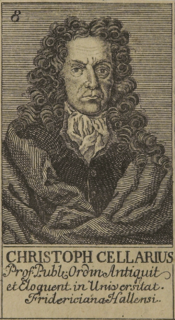 W
WChristoph (Keller) Cellarius was a German classical scholar from Schmalkalden who held positions in Weimar and Halle. Although the Ancient-Medieval-Modern division of history was used earlier by Italian Renaissance scholars Leonardo Bruni and Flavio Biondo, Cellarius' Universal History Divided into an Ancient, Medieval, and New Period helped popularize it. After him, this tripartite division became standard.
 W
WLeonhard Euler was a Swiss mathematician, physicist, astronomer, geographer, logician and engineer who made important and influential discoveries in many branches of mathematics, such as infinitesimal calculus and graph theory, while also making pioneering contributions to several branches such as topology and analytic number theory. He also introduced much of the modern mathematical terminology and notation, particularly for mathematical analysis, such as the notion of a mathematical function. He is also known for his work in mechanics, fluid dynamics, optics, astronomy and music theory.
 W
WAugust Hermann Francke was a German Lutheran clergyman, theologian, philanthropist, and Biblical scholar.
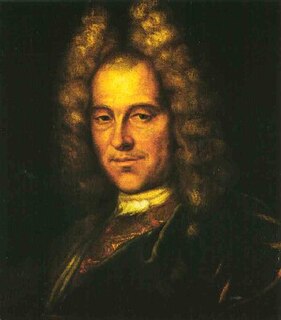 W
WJohann Joseph Fux was an Austrian composer, music theorist and pedagogue of the late Baroque era. His most enduring work is not a musical composition but his treatise on counterpoint, Gradus ad Parnassum, which has become the single most influential book on the Palestrinian style of Renaissance polyphony.
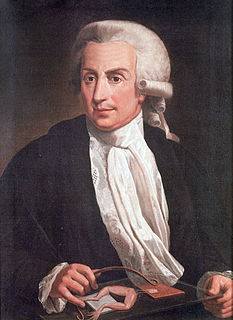 W
WLuigi Galvani was an Italian physician, physicist, biologist and philosopher, who discovered animal electricity. He is recognized as the pioneer of bioelectromagnetics. In 1780, he and his wife Lucia discovered that the muscles of dead frogs' legs twitched when struck by an electrical spark. This was one of the first forays into the study of bioelectricity, a field that studies the electrical patterns and signals from tissues such as the nerves and muscles.
 W
WJohann Matthias Gesner was a German classical scholar and schoolmaster.
 W
WGiovanni Vincenzo Gravina was an Italian man of letters and jurist. He was born at Roggiano Gravina, a small town near Cosenza, in Calabria.
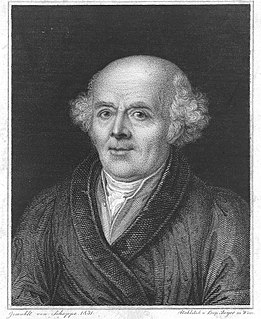 W
WChristian Friedrich Samuel Hahnemann was a German physician, best known for creating the pseudoscientific system of alternative medicine called homeopathy.
 W
WLudvig Holberg, Baron of Holberg was a writer, essayist, philosopher, historian and playwright born in Bergen, Norway, during the time of the Dano-Norwegian dual monarchy. He was influenced by Humanism, the Enlightenment and the Baroque. Holberg is considered the founder of modern Danish and Norwegian literature. He is best known for the comedies he wrote in 1722–1723 for the Lille Grønnegade Theatre in Copenhagen. Holberg's works about natural and common law were widely read by many Danish law students over two hundred years, from 1736 to 1936.
 W
WGiovanni Maria Lancisi was an Italian physician, epidemiologist and anatomist who made a correlation between the presence of mosquitoes and the prevalence of malaria. He was also known for his studies about cardiovascular diseases, and is remembered in the eponymous Lancisi's sign.
 W
WGottfried Wilhelm (von) Leibniz was a prominent German polymath and one of the most important logicians, mathematicians and natural philosophers of the Enlightenment. As a representative of the seventeenth-century tradition of rationalism, Leibniz developed, as his most prominent accomplishment, the ideas of differential and integral calculus, independently of Isaac Newton's contemporaneous developments. Mathematical works have consistently favored Leibniz's notation as the conventional expression of calculus. It was only in the 20th century that Leibniz's law of continuity and transcendental law of homogeneity found mathematical implementation. He became one of the most prolific inventors in the field of mechanical calculators. While working on adding automatic multiplication and division to Pascal's calculator, he was the first to describe a pinwheel calculator in 1685 and invented the Leibniz wheel, used in the arithmometer, the first mass-produced mechanical calculator. He also refined the binary number system, which is the foundation of nearly all digital computers, including the Von Neumann machine, which is the standard design paradigm, or "computer architecture", followed from the second half of the 20th century, and into the 21st.
 W
WCharles François Lhomond was a French priest, grammarian, and educator who was a native of Chaulnes, Somme.
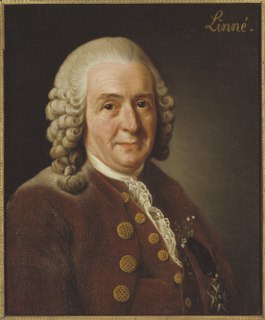 W
WCarl Linnaeus, also known after his ennoblement as Carl von Linné, was a Swedish botanist, zoologist, and physician who formalised binomial nomenclature, the modern system of naming organisms. He is known as the "father of modern taxonomy". Many of his writings were in Latin, and his name is rendered in Latin as Carolus Linnæus.
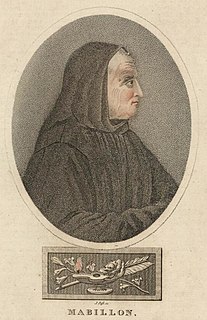 W
WDom Jean Mabillon, O.S.B., was a French Benedictine monk and scholar of the Congregation of Saint Maur. He is considered the founder of the disciplines of palaeography and diplomatics.
 W
WGian (Giovanni) Domenico Mansi was an Italian prelate, theologian, scholar and historian, known for his massive works on the Church councils.
 W
WCount Luigi Ferdinando Marsili was an Italian scholar and eminent natural scientist, who also served as an emissary and soldier.
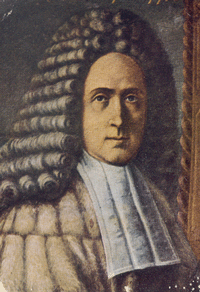 W
WGiovanni Battista Morgagni was an Italian anatomist, generally regarded as the father of modern anatomical pathology, who taught thousands of medical students from many countries during his 56 years as Professor of Anatomy at the University of Padua.
 W
WLodovico Antonio Muratori was an Italian historian, notable as a leading scholar of his age, and for his discovery of the Muratorian fragment, the earliest known list of New Testament books.
 W
WSir Isaac Newton was an English mathematician, physicist, astronomer, theologian, and author who is widely recognised as one of the most influential scientists of all time and as a key figure in the scientific revolution. His book Philosophiæ Naturalis Principia Mathematica, first published in 1687, established classical mechanics. Newton also made seminal contributions to optics, and shares credit with Gottfried Wilhelm Leibniz for developing the infinitesimal calculus.
 W
WPeter Simon Pallas FRS FRSE was a Prussian zoologist and botanist who worked in Russia (1767–1810).
 W
WGiovanni Poleni was a Marquess, physicist, mathematician and antiquarian.
 W
WAdriaan Reland was a noted Dutch Orientalist scholar, cartographer and philologist. Even though he never left the Netherlands, he made significant contributions to Middle Eastern and Asian linguistics and cartography, including Persia, Japan and the Holy Lands.
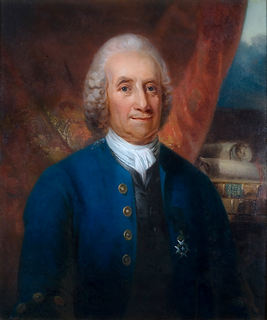 W
WEmanuel Swedenborg was a Swedish pluralistic-Christian theologian, scientist, philosopher and mystic. He is best known for his book on the afterlife, Heaven and Hell (1758).
 W
WJoseph Tiefenthaler was a Jesuit missionary and one of the earliest European geographers to write about India.
 W
WAbraham Vater was a German anatomist from Wittenberg.
 W
WJohann Georg Ritter von Zimmermann / Johann Georg Zimmermann was a Swiss philosophical writer, naturalist, and physician.